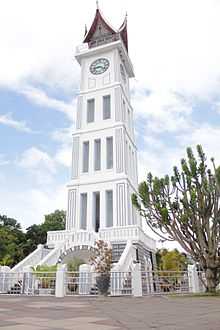Jam Gadang
Coordinates: 0°18′19″S 100°22′10″E / 0.305210°S 100.3694°E
| Jam Gadang | |
|---|---|
 Jam Gadang in May 2011 | |
| Location | Bukittinggi |
| Designer | Yazid Abidin, Sutan Gigi Ameh & Haji Moran |
| Height | 26 metres (85 ft) |
| Beginning date | 1926 |
| Completion date | 1926 |
| Dedicated to | Bukittinggi City Secretary |
Jam Gadang (literally "Big Clock") is a clocktower and major landmark of the city of Bukittinggi, West Sumatra, Indonesia. It is located in the centre of the city, near the main market, Pasar Atas, and is a tourist attraction. This clocktower has large clocks on each side and was given the name "Jam Gadang" (English: big clock).
History

The structure was built in 1926 during the Dutch colonial era, as a gift from the Queen to city's controleur. It was designed by architects Yazin and Sutan Gigi Ameh. Originally a rooster figure was placed on the apex, but it was changed into a Jinja-like ornament during the Japanese occupation. Following Indonesian independence, it was reshaped to its present form resembling traditional Minangkabaun roofs (see Rumah gadang). It is said to have cost 3,000 guilder.
Clock structure
Each clock face has a diameter of 80 centimetres (31 in). Its base is 13 by 4 metres (43 ft × 13 ft) and stands 26 metres (85 ft) tall.
One unique clock feature uses "IIII" for the number 4 instead of the traditional Roman number "IV". Based on a local story, the four vertical lines represents the four workers who died while constructing the building.
The laying of the Jam Gadang cornerstone was done by the 6-year-old son of Rook Maker, the city secretary of Bukittinggi at the time.
Tourism
Given its iconic appearance, the structure is a frequent object of local souvenirs. It is printed on apparel, painted, used as a sculpting model, and so forth. As of January 2008, it cost 50,000 rupiahs (around US $5) to enter the tower.
Its plaza serves as the centre of New Year celebration in Bukittinggi.
-
Jam Gadang in 2006
-

Jam Gadang front view
-

Jam Gadang uses 'IIII' instead of 'IV'
-

Dokar kind of Horsecar for sight seeing
See also
| Wikimedia Commons has media related to Jam Gadang. |
